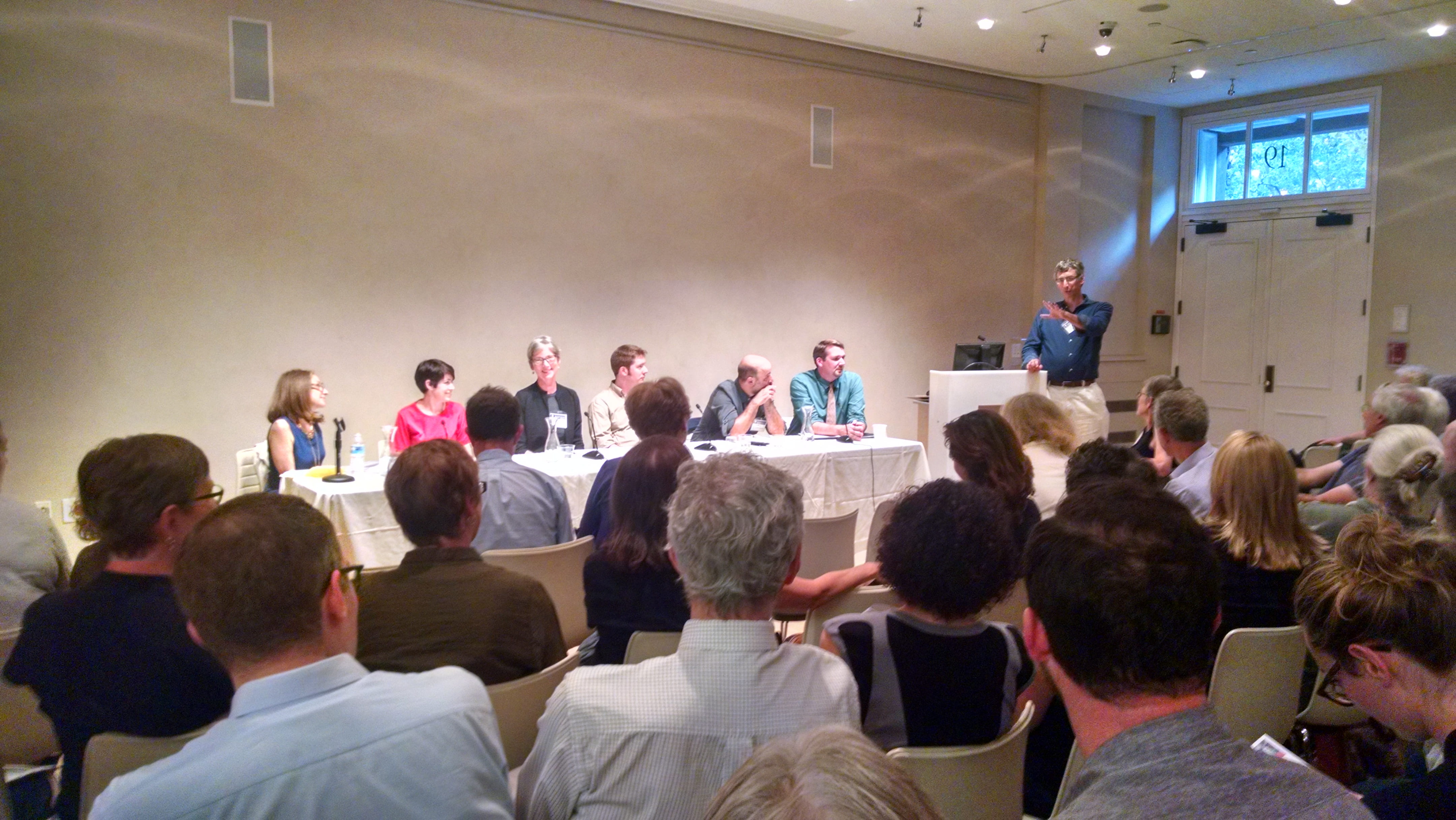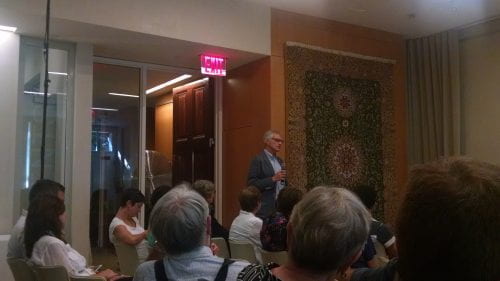By Daniel London
New York Intellectual, Global Historian, a conference honoring New York University’s Thomas Bender last week, attracted humanities practitioners from across departments and disciplines: urbanists, intellectual historians, journalists, law, film studies, and public historians among others. This came about in part from the character of Bender’s scholarship, which has made contributions to a wide range of fields in such books as New York Intellect and A Nation Among Nations. But it also spoke to his methodological, professional, and ethical commitment to bridging and bringing into dialogue all such fields, blurring the lines between national and international, academy and public, wholes and parts. To a large extent, this conference represented a taking-stock of how different scholars have taken up his “conversational imperative” and what the challenges and opportunities for such dialogue are today.

This theme was directly addressed in the opening panel, “The Significance of Synthetic Thinking in American History.” Participants reflected on Bender’s influential 1986 article “Wholes and Parts: The Need for Synthesis in American History” and its call for an integrative framework wherein histories of particular social groups could be brought into conversation with one another around the broader narrative of the nation-state’s development. The tension here between ‘narrative’, with its potentially valorizing and reifying connotations, and ‘conversation’ attracted sustained attention. Amy Richter framed her teaching and research inquires by highlighting intergroup conversations in which the meaning of different terms, like ‘community,’ are debated, discussed, and misunderstood. The extent to which a society (or a classroom) agrees on the meaning and value of a certain term is one that can be empirically explored, with ideas left out being as important as those included. Film historian Saverio Giovacchini, in a particularly inspiring analogy, compared Bender’s approach towards historical synthesis to that of Jean Renoir in La Règle du jeu (Rules of the Game), who began his project by attempting to condemn the French bourgeois but found himself unable to explain or understand that group without seeing their relations to a wider social network of workers, aristocrats, celebrities, and so on. Such activity does not eliminate questions of right, wrong, and power, but foregrounds them with the actual reasons and relations of different actors with one another.
Panelists then examined the influence and further applications of Bender’s call for synthesis. Giovacchini found that the ethos behind television shows like The Wire suggested a kind of “Benderian” vision highlighting interdependencies rather than single groups. Andrew Needham found that monographs today are increasingly evaluated by their degree of connection with broader sets of stories, which was not the case earlier in the 1990s. On the other hand, Nathan Connolly stressed that a lack of diversity within history departments provided a structural limit to the degree of synthetic narratives they could produce: “You can’t hear those voices unless they are in the room.” Bender believes that journalists, who combine archival skill with the capacity to write for a broad audience—have begun taking the place of historians as crafters of synthetic historical stories. In contrast, Alice Fahs wondered whether historians themselves needed to become popularizers of their own work, or if some fruitful division of labor was necessary. There was an “assumption that everyone needs to be able to speak to everyone,” she stated, but perhaps “we do not all need to do this.”
The second panel of the conference, “Framing American History,” placed the previous day’s theme of synthesis in the context of divisions between national and international history. Daniel Kotzin found that beginning his survey of Buffalo’s history with European developments rather than the more traditional Erie Canal narrative “opened up” the subject to his students. Marc Aronson seconded this, claiming that most of his students have a far deeper connection with global events and cultural currents than with their local community (particularly business majors). Growth of the International Baccalaureate (IB) program in America promises to enhance interest in global history. Andie Tucher explained that highlighting narratives relating to her globally-diverse student body reaped great dividends, but worried that she was indulging in the politics of representation rather than deeper narrative cross-pollination.
Other panelists stressed the still-pervasive barriers within history departments that prevented international dimension in research and teaching. Tracy Neumman recounted that no Americanists in her department wanted to teach the Post-World War II global history survey with the excuse that they weren’t trained to look outside national borders – surely a self-fulfilling prophecy. Heightened standards for transnational scholarship that stresses multi-lingual archival research enhances its already considerable expense and length, exacerbated by the pervasive unwillingness of grant makers to support multi-national research.
David Hollinger characterized Bender as the embodiment of the “cosmopolitan idea as properly understood,” that being the “effort to take in as much of human experience as you can while retaining the capacity to function, live a real life, and make decisions.” Expanding on this theme, Hollinger examined how his professional and scholarly work strove both to foster heterogeneous dialogue and recognize the necessity of deep scholarly reflection and pragmatic action. In New York Intellect for example, Bender stressed the need for urban universities to cultivate a “semi-cloistered heterogeneity” in order to conduct cosmopolitan thinking in ways that even diverse metropoles cannot sustain, even as they take part in matters of public concern and debate on the local level. Community and Social Change critiqued the over-drawn framework of Gesellschaft and Gemeinschaft present in much of modernization theory, switching criteria for community to the shared experience of mutual understanding and obligation that transcend mere proximity or locality. This understanding arguably informs much of social history since, such as Lizabeth Cohen’s Making a New Deal. Hollinger also recounted the story of how once, in a California conference on intellectual history co-organized with Carl E. Schorske, Bender had no qualms excising the long winded and jargon-ridden contributions of philosophers from the resulting book in the interest of a more balanced and cohesive whole.
The final panel, “A Historians’ Historian and the Future of the Humanities,” took up the question of how humanities practitioners can remain publicly engaged, relevant, and employed – one to which Bender drew attention in The Education of Historians for the Twenty-First Century. Valentijn Byvanck described the wealth of local historical societies and re-enactors encountered during his planning of a proposed national museum on Dutch History, namely organizations suggesting a popular interest in history which historians ignore at their own peril. Robert W. Snyder concurred, adding to the list K-12 teacher-training workshops, local history organizations, and oral history projects conducted by libraries. Jeanne Houch recounted her work in documentary film as a means of drawing a broader public into fundamental questions being debated in academia. Stephen Mihm intriguingly suggested that historians work alongside business, STEM, and mathematics practitioners in order to reach the public, but I am not entirely sure what this would look like. Issues like climate change certainly call for multi-disciplinary engagement, but are there others? These opportunities were leavened by vivid accounts of still-pervasive institutional constraints on public engagement by historians: ‘alt-academic’ projects are rarely taken into consideration by tenure committees, and graduate students are rarely trained on how to apply for public-history fellowships or job openings. All too many historians are—to use Claire Potter’s analogy—content to stay in their boxes.
The conference ended on a somewhat ambivalent, if still optimistic note. Both Bender and Barbara Weinstein stressed that we have been here before: excepting the classes of 1955 to 1963, one-third of all history Ph.Ds in the 20th century did not take academic positions. The jobs crisis of the late 1970s (worse than the one today) was unrelieved by the still-nascent opportunities of public history. Any implication for quiescence was stilled by Bender’s further resolution that in the future “things are going to be unimaginably different” for both the academy and the humanities more generally; in other interviews and an SSRC essay, he suggested what this might look like.
I have long been inspired by Bender’s commitment to bridging institutional barriers within and without the academy, and it was heartening to see the extent to which they will continue to be built upon and practiced by generations of scholars. His championing of public history as a valid activity for historians has garnered a particularly enthusiastic, and hopefully long-lasting, response. At the same time, the academically-anchored political historian in me pined for more examples of unashamedly scholarly work taking up his original call for robust historical synthesis, arrived at through an analysis of “public conversation.” Mary Ryan’s Civic Wars stands out as a particularly notable model, but fewer works come to mind that cover periods beyond the late 19th and early 20th century or that engage with more recent developments in historiography, particularly the history of capitalism and the institutional turn.
This is unfortunate, as I think Bender’s concept of “public conversation” has the potential, via integrating network dynamics, social history, and cultural/intellectual considerations, to dramatically re-orient the way we talk about American political development and – possibly – help us make our work more popular and relevant in the process. But this is just a personal hang-up. All in all, the conference succeeded where it was supposed to by doing full justice to the man – ideas, spirit, and all.
Corrections (10/4/15): an SSRC essay was incorrectly referred to as an interview, and the broad statistic of one-third of history PhD. taking non-academic positions was revised to reflect different career paths chosen.
Daniel London is a Ph.D. candidate in American History at New York University. He studies the growth of social politics in the late 19th/early 20th century North Atlantic, focusing on metropolitan space and the urban public sphere as his corpus. Follow him on twitter at @dlondongc, and check out his blog at publicspaced.com.
Featured Image: New York Intellectual, Global Historian, September 18-19th, 2015 NYC (photo © Daniel London).




September 30, 2015 at 5:49 am
Reblogged this on Public-Spaced and commented:
A post of mine at the Journal of the History of Ideas blog